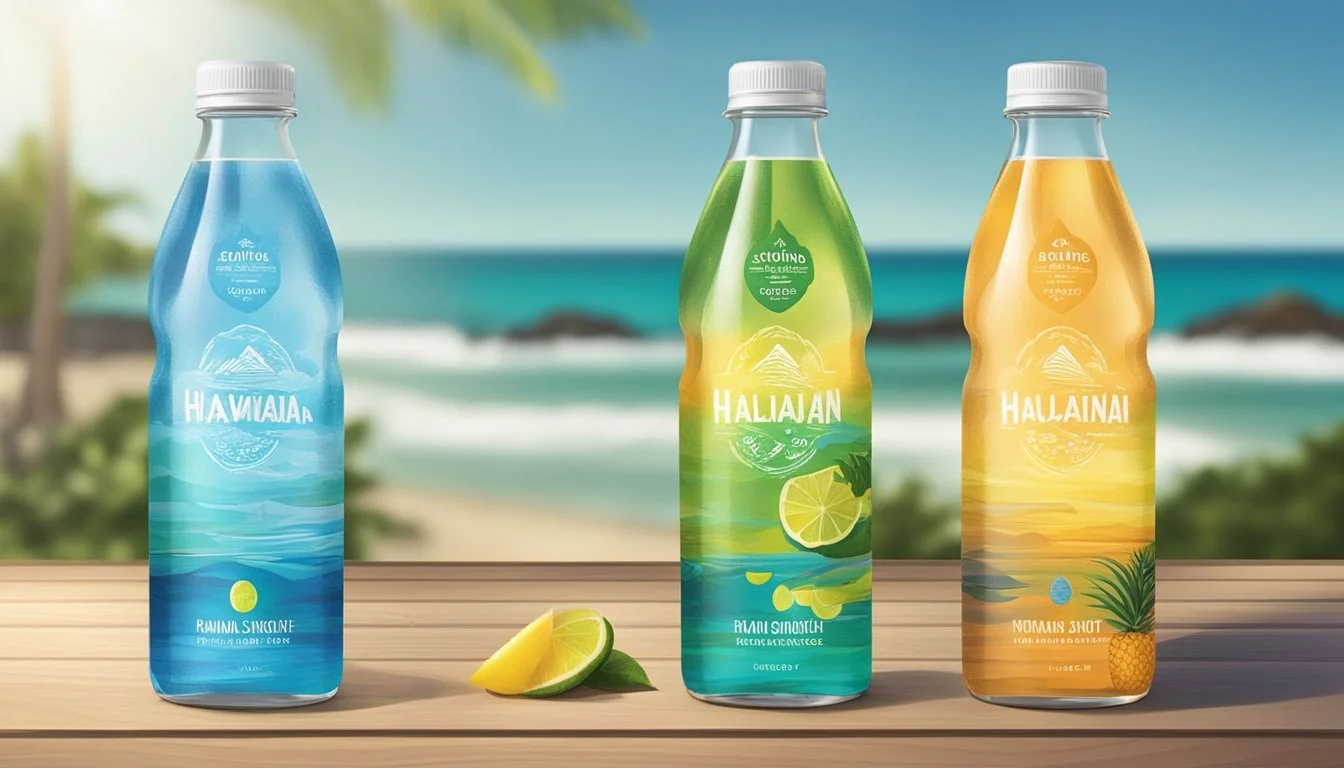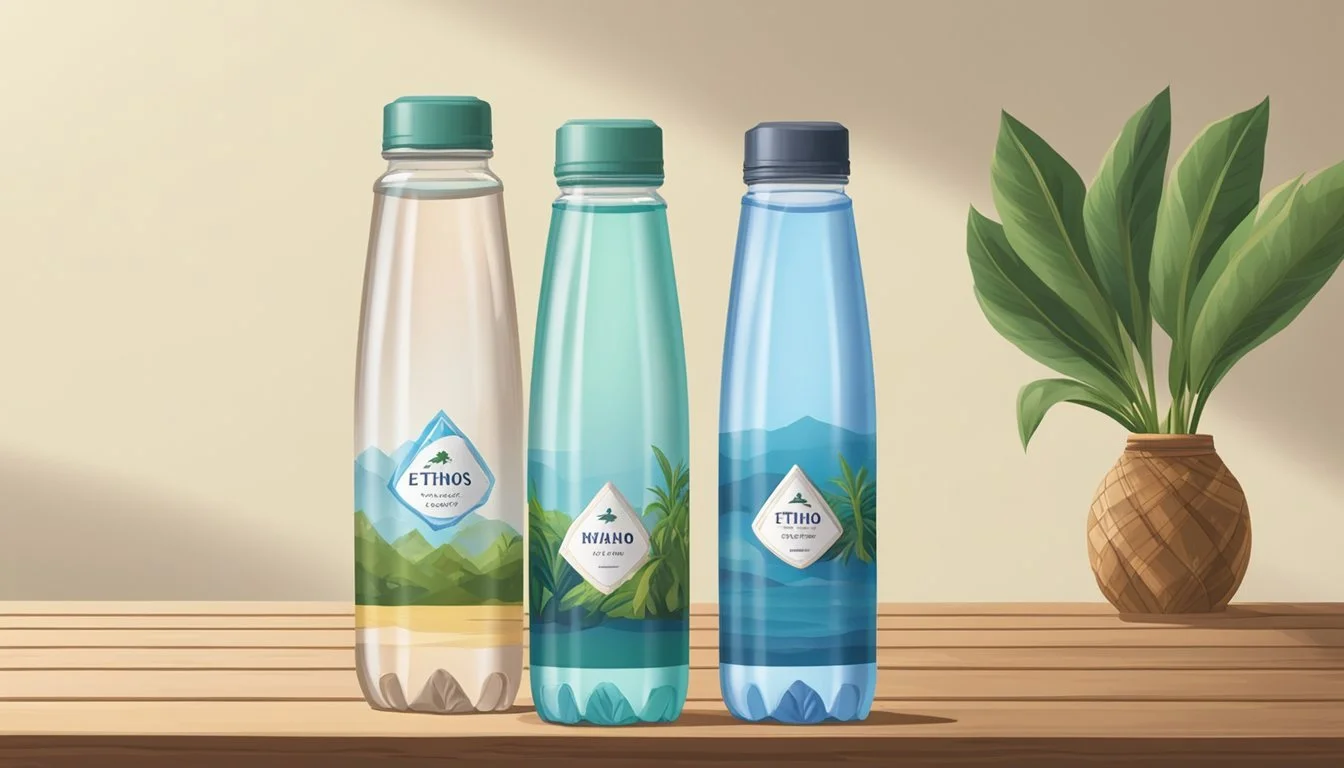Ethos vs. Hawaiian Springs
Comparing Premium Bottled Waters
The competition between bottled water brands is fierce, with many consumers seeking the perfect blend of taste, quality, and purity. In this matchup, Ethos and Hawaiian Springs stand out as two distinctive choices. Ethos Bottled Water is widely recognized for its commitment to funding water programs in developing countries, making it a socially conscious option for consumers. Hawaiian Springs, on the other hand, prides itself on its pristine source in the Big Island rainforest, offering a natural and refreshing taste.
Ethos water hails from various sources in the United States, carefully filtered and packaged to ensure a consistent quality. Its mission-driven approach attracts consumers who value ethical consumption. In contrast, Hawaiian Springs bottling process captures the essence of Hawaii's volcanic origins, resulting in water with a unique mineral composition and smooth taste. This makes it a favorite among those who appreciate the natural purity of its volcanic filtration.
Choosing between Ethos and Hawaiian Springs ultimately depends on individual preferences and values. Those prioritizing social impact may lean towards Ethos, while others who focus on natural taste and origin might prefer Hawaiian Springs.
Understanding Bottled Water
Bottled water comes in various forms, each with distinct characteristics. This section breaks down the basics, categories, and regulations governing bottled water to provide a comprehensive understanding.
The Basics of Bottled Water
Bottled water is simply water packaged in bottles for individual consumption. Significant variations exist in the sources and treatment processes used. Spring water is collected from natural springs, while mineral water contains minerals like calcium and magnesium, naturally sourced from the protected underground layers.
Alkaline water has a higher pH level, often achieved through ionization. Sparkling water is infused with carbon dioxide gas for a bubbly texture. The attraction lies in the perceived health benefits, convenience, and taste preferences associated with each type.
Categories of Bottled Water
Bottled water falls into several categories based on source and composition. Spring water is derived from natural springs and typically not subjected to extensive processing. Mineral water must contain a certain level of naturally occurring minerals and is recognized for its taste and health benefits.
Alkaline water boasts a higher pH, which some believe helps neutralize acidity in the body, although scientific validation is limited. Sparkling water offers a refreshing effervescence and is often used as a soda alternative. Each category provides unique properties, based on the consumer's preference and lifestyle.
Bottled Water Regulations and Standards
Bottled water is regulated to ensure safety and quality. In the United States, the Food and Drug Administration (FDA) oversees bottled water, requiring it to meet standards similar to those set by the Environmental Protection Agency (EPA) for tap water.
Labeling must accurately reflect the content and source of the water. Quality control processes, including regular testing for contaminants, are mandatory. Internationally, standards vary, but similar regulatory frameworks exist to guarantee bottled water safety and consumer transparency.
These regulations and standards aim to protect consumers while maintaining the integrity of bottled water products across various categories.
What Makes Ethos Water Unique
Ethos Water stands out for its dedicated efforts towards community contributions, sustainability, and a meticulous purification process. Its unique selling points are deeply intertwined with its origin, purity, and social impact.
Ethos Water Source and Origin
Ethos sources its water primarily from carefully selected springs. The origins of these springs are often in pristine, remote areas known for their natural mineral content and purity. This strategic selection ensures that the water is not only clean but also enriched with essential minerals that enhance its taste and health benefits.
The company places significant importance on maintaining the natural status of these sources, protecting the surrounding environments from contamination and degradation. This commitment to source integrity is a key element in their quality control process.
Purification and Filtration Methods
Ethos employs a rigorous purification process to ensure the highest standards of water quality. After extraction, the water undergoes multiple stages of filtration to remove impurities. These stages often include sediment filtration, activated carbon filtering, and UV treatment.
Each of these steps is designed to eliminate contaminants while preserving beneficial minerals. This meticulous filtration method guarantees that Ethos Water is exceptionally pure, safe for consumption, and retains a refreshing taste that consumers appreciate.
Community and Sustainability Efforts
A standout feature of Ethos Water is its dedication to charitable initiatives and sustainability. A portion of the proceeds from every bottle sold goes towards funding clean water projects in developing countries. This initiative aims to provide sustainable water solutions and improve overall community health.
Additionally, Ethos is committed to environmental sustainability. The brand uses recyclable materials for its packaging and implements practices to reduce its carbon footprint. These efforts reflect Ethos' broader commitment to social and environmental responsibility, making it a brand that consumers can feel good about supporting.
Hawaiian Springs: A Tropical Choice
Hawaiian Springs offers a naturally alkaline water with a unique origin. The company emphasizes environmental sustainability and rigorous quality control throughout its bottling process.
The Water Source Behind Hawaiian Springs
Hawaiian Springs draws its water from artesian wells located on the slopes of Mauna Loa, an active volcano in Hawaii. The water travels through ancient lava rock, which provides natural filtration and gives the water a distinctive mineral composition. This source ensures not only the purity but also a naturally alkaline pH of around 7.7. The location in the District of Puna, renowned for its lush environment, contributes to the water’s unique taste and high quality.
Bottling Process and Quality Assurance
Once harvested from the renewable aquifers, Hawaiian Springs water is bottled immediately to preserve its freshness. The bottling process includes several stages of filtration to remove any impurities that could be introduced post-extraction. Each bottle is durable and fully recyclable, adhering to high-quality standards to ensure the water remains pristine from source to consumer. Rigorous water testing is conducted regularly, verifying both the mineral content and overall safety of the water.
Hawaiian Springs' Commitment to Environment
Hawaiian Springs is dedicated to minimizing natural spring damage and reducing its environmental impact. The water is harvested sustainably from aquifers that are renewable, ensuring that the natural balance isn't disrupted. By using recyclable packaging, they aim to reduce plastic waste significantly. Moreover, the company is involved in various conservation and reforestation efforts in Hawaii, reinforcing their commitment to preserving the island’s natural resources for future generations.
Comparative Analysis: Ethos vs. Hawaiian Springs
This section examines the key differences between Ethos and Hawaiian Springs bottled water, focusing on taste, health benefits, environmental impact, and packaging. Each brand has unique characteristics that set them apart.
Taste Profile Comparison
Ethos water is often characterized by a clean, crisp taste with a neutral pH, making it versatile for various preferences. It aims to offer a refreshing experience with minimal aftertaste.
Hawaiian Springs, on the other hand, features a naturally sweet and smooth flavor due to its volcanic origins. The water is collected from aquifers surrounded by lava rock, which contributes to its distinct taste.
Consumers who prefer a subtler flavor might lean towards Ethos, while those looking for a more pronounced natural sweetness might opt for Hawaiian Springs.
Health Benefits and Mineral Content
When it comes to mineral content, Ethos provides a balanced profile with essential minerals like magnesium and calcium but avoids artificial additives. This makes it a suitable choice for those monitoring their mineral intake without sacrificing purity.
Hawaiian Springs water boasts a higher mineral content, rich in electrolytes due to its volcanic filtration process. The naturally occurring minerals such as silica and potassium offer specific health benefits, including improved hydration and potential skin health enhancements.
For consumers seeking water with beneficial minerals, Hawaiian Springs might be more appealing.
Environmental Impact and Sustainability
Ethos emphasizes its commitment to environmental responsibility through the use of recyclable materials and has integrated sustainability into their packaging and business practices. They also donate a portion of their proceeds to clean water initiatives worldwide.
Hawaiian Springs places a strong focus on preserving the local environment in Hawaii. Their production process is designed to minimize ecological disruption, and they also use recyclable materials.
Both brands are aligned in their sustainability efforts, but Ethos extends its impact through charitable contributions, adding an extra layer of social responsibility.
Packaging and Brand Presence
Ethos packaging is sleek and modern, often featuring clear, minimalist designs that appeal to a wide audience. Their bottles are made from eco-friendly materials, aligning with their sustainability message.
Hawaiian Springs uses bright, vibrant packaging that reflects the Hawaiian landscape, with images of tropical scenes and volcanic imagery. This not only sets them apart on shelves but also emphasizes their Hawaiian origin.
In terms of brand presence, Ethos is widely recognized in various retail locations due to its affiliation with larger corporations, while Hawaiian Springs is often seen as a premium product in specialized markets. This distinction in branding and availability can influence consumer preferences.
Consumers' Guide to Making an Informed Choice
Choosing between Ethos and Hawaiian Springs bottled water involves evaluating key factors like TDS and pH, cost comparisons, and accessibility.
Decoding the Label: Understanding TDS and pH
Total Dissolved Solids (TDS) refers to the combined content of all inorganic and organic substances in water. Lower TDS levels generally indicate purer water. Ethos water typically has a TDS level around 40-50 mg/L, while Hawaiian Springs offers a TDS of roughly 100 mg/L, giving it a more pronounced mineral taste.
pH levels denote the acidity or alkalinity of water. A neutral pH is 7. Ethos water usually falls between 7.2 to 7.4, making it slightly alkaline. Hawaiian Springs boasts a pH level close to 7.7, promoting itself as naturally alkaline, which is often marketed as beneficial for health.
The Price of Purity: Comparing Costs
When evaluating the cost of bottled water, it is essential to consider both the price per bottle and the frequency of consumption. Ethos water is often priced higher, partly due to its brand's charitable initiatives. A 500ml Ethos bottle can cost around $2.00 to $2.50.
Hawaiian Springs, on the other hand, is generally more affordable, with prices ranging from $1.50 to $2.00 per 500ml bottle. The choice here may depend on the consumer’s budget and their perception of the brand's value.
Convenience and Availability
Availability and convenience can significantly influence purchasing decisions. Ethos water is widely stocked in grocery stores like Safeway and Whole Foods and also in many Starbucks locations due to their partnership.
Hawaiian Springs has more selective availability, often found in specialty stores and some major supermarket chains in Hawaii and select mainland locations. While Ethos offers broader accessibility, those specifically seeking Hawaiian Springs might need to check for availability in nearby specialty shops or online retailers.
Beyond the Bottle: Water in the Wider Context
Examining bottled water brands extends beyond just taste and packaging. The impact on the environment, comparisons with tap water, and future trends in water purification all play a significant role.
Water Footprint of Bottled Water Brands
The water footprint of bottled water production is significant. Estimates suggest that producing one liter of bottled water requires approximately three liters of water. This includes the water used in the purification and filtration processes.
Hawaiian Springs focuses on sourcing water from natural springs, which raises concerns about sustainability. Ethos emphasizes sustainability efforts, including the use of recyclable bottles. However, both brands contribute to the significant water footprint associated with bottled water.
The Debate: Bottled Water vs. Tap Water
One major debate surrounds the choice between bottled water and tap water. Tap water is generally subject to stringent regulatory standards and frequent quality checks.
Many bottled water brands, including Ethos and Hawaiian Springs, undergo additional purification processes. This can include filtration, reverse osmosis, and UV treatment. Despite this, some argue that tap water remains a more sustainable option due to reduced plastic waste.
The Future of Water: Trends and Innovations
The future of the water industry includes a strong focus on sustainability and innovation. Key trends include the development of biodegradable bottles and advanced filtration technologies.
Ethos and others are leading with charitable contributions to clean water initiatives. Meanwhile, new innovations aim to reduce the environmental impact of bottled water. Improved purification methods are being researched to ensure both quality and minimal environmental footprint.
More About Ethos
Ethos vs Mountain Valley Spring Water: Which Bottled Water is Better?
Ethos vs Richard's Rainwater: Which Bottled Water is Better?
Ethos vs Whole Foods Italian Still Mineral water: Which Bottled Water is Better?
More About Hawaiian Springs
Acqua Pana vs Hawaiian Springs: Which Bottled Water is Better?
Aqua Carpatica vs Hawaiian Springs: Which Bottled Water is Better?
Aquafina vs Hawaiian Springs: Which Bottled Water is Better?
Arrowhead vs Hawaiian Springs: Which Bottled Water is Better?
Boxed Water vs Hawaiian Springs: Which Bottled Water is Better?
Castle Rock vs Hawaiian Springs: Which Bottled Water is Better?
Core Hydration vs Hawaiian Springs: Which Bottled Water is Better?
Deer Park vs Hawaiian Springs: Which Bottled Water is Better?
Essentia vs Hawaiian Springs: Which Bottled Water is Better?
Hawaiian Springs vs 1907water: Which Bottled Water is Better?
Hawaiian Springs vs 7-Select: Which Bottled Water is Better?
Hawaiian Springs vs Alkaline88: Which Bottled Water is Better?
Hawaiian Springs vs Antipodes: Which Bottled Water is Better?
Hawaiian Springs vs Big Chill: Which Bottled Water is Better?
Hawaiian Springs vs BodyArmor: Which Bottled Water is Better?
Hawaiian Springs vs Cascade Mountain: Which Bottled Water is Better?
Hawaiian Springs vs CBD Living: Which Bottled Water is Better?
Hawaiian Springs vs Crystal Geyser: Which Bottled Water is Better?
Hawaiian Springs vs Crystal Lake: Which Bottled Water is Better?
Hawaiian Springs vs Essence pH10: Which Bottled Water is Better?
Hawaiian Springs vs Hawaii Volcanic: Which Bottled Water is Better?
Hawaiian Springs vs Kirkland Signature: Which Bottled Water is Better?
Hawaiian Springs vs Liquid Death: Which Bottled Water is Better?
Hawaiian Springs vs Mananalu: Which Bottled Water is Better?
Hawaiian Springs vs Open Water: Which Bottled Water is Better?
Hawaiian Springs vs Proud Source: Which Bottled Water is Better?
Hawaiian Springs vs Pure Life: Which Bottled Water is Better?
Hawaiian Springs vs Purely Sedona: Which Bottled Water is Better?
Hawaiian Springs vs Refreshe: Which Bottled Water is Better?
Hawaiian Springs vs Richard's Rainwater: Which Bottled Water is Better?
Hawaiian Springs vs Simple Truth: Which Bottled Water is Better?
Hawaiian Springs vs Solan de Cabras: Which Bottled Water is Better?
Hawaiian Springs vs Talking Rain AQA: Which Bottled Water is Better?
Hawaiian Springs vs The Well: Which Bottled Water is Better?
Hawaiian Springs vs Tru Alka: Which Bottled Water is Better?
Hawaiian Springs vs Weird Water: Which Bottled Water is Better?
Hawaiian Springs vs Whole Foods 365: Which Bottled Water is Better?
Hawaiian Springs vs Whole Foods Italian Still Mineral water: Which Bottled Water is Better?
Ice Mountain vs Hawaiian Springs: Which Bottled Water is Better?
Icelandic Glacial vs Hawaiian Springs: Which Bottled Water is Better?
Just Water vs Hawaiian Springs: Which Bottled Water is Better?
Mountain Valley Spring Water vs Hawaiian Springs: Which Bottled Water is Better?
Nestle Pure Life vs Hawaiian Springs: Which Bottled Water is Better?
Poland Spring vs Hawaiian Springs: Which Bottled Water is Better?
San Pellegrino vs Hawaiian Springs: Which Bottled Water is Better?
Smartwater vs Hawaiian Springs: Which Bottled Water is Better?
Topo Chico vs Hawaiian Springs: Which Bottled Water is Better?
Zephyrhills vs Hawaiian Springs: Which Bottled Water is Better?






